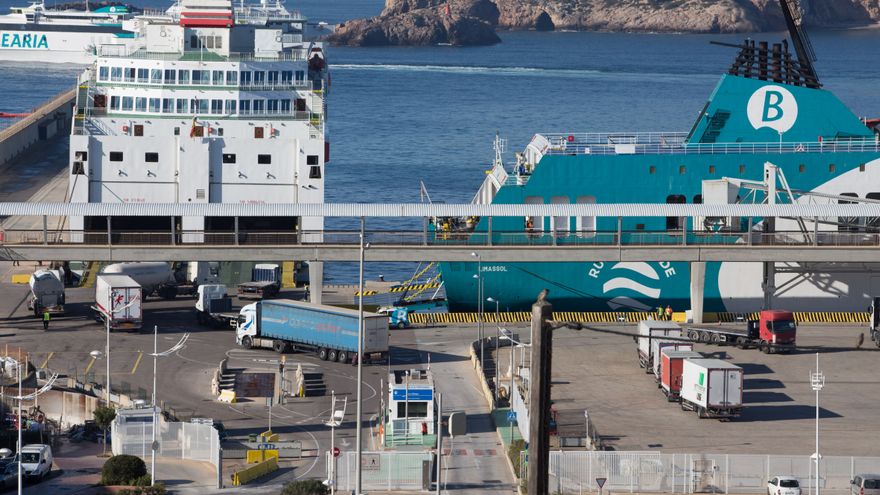“Either you raise prices or you close down”. José Raya, president of the Asociación de Transportistas de la Petita i Mitjana Empresa d’Eivissa i Formentera (Pimeef) and owner of a logistics company, is as clear as day about the rise in fuel prices. In his case, this very week he has begun to pass on the new rates to his clients, which have increased by between 15 and 20%, the same percentage that other businessowners consulted by Raya have been forced to apply.
“We had not raised prices for years,” the employers’ representative points out, adding that between January of last year and January of this year, fuel prices have shot up by 50%. The cost of diesel represents approximately 33% of the operating costs of the island’s businesses, in addition to the depreciation of vehicles and, above all, personnel, which is what absorbs the most resources.
In addition to the rise in fuel prices, Raya adds that there is “little manpower” and that there is a transfer of workers between companies, which has made it necessary to “raise salaries”. “The number of late payments has also skyrocketed,” he says. Another “problem” affecting companies in the sector are the mechanical workshops that “have fewer and fewer parts and labour”. If before, a breakdown was solved in two days, now you can have a car at a standstill for a week,” he laments.
In any case, the president of the Pimeef Transport Association points out that since the second half of February there has been an increase in work. “Now there is a lot of work, an incredible amount. You only have to look at the state of construction, which moves everything”, he justifies, while pointing out that, in his opinion, the rise in prices as a result of the increase in fuel prices will not affect the growing activity in his sector. “It [the general price increase] is going to be absorbed well. If you need something, you have to pay for it. It’s a chain. We have to charge more to provide the service,” he says.
That said, Raya laments the uncertainty about the economic consequences of Russia’s invasion of Ukraine. “We will have to see what happens with rich tourism, and the issue of boats. Pimeef is talking about German tourism, which, since that country is very dependent on gas and things get bad, let’s see if they will back out,” he says.
Public bus transport
For their part, public road transport concessionaires are also suffering the consequences of the rise in fuel prices and the uncertainty as to whether the situation could get worse. “I have never seen anything like this before. In the last two years things have happened that we had never seen before, this is one of them,” says the manager of Voramar-El Gaucho, of the Alsa group, and vice president and representative in Ibiza of the Balearic Transport Business Federation José María Cardona, referring to the escalation of diesel prices. “We are also affected by the problem of spare parts, but it is minor compared to fuel,” he says.
Public road transport has “a very limited margin [of profit], with prices controlled by the Administration”, which is why he calls for authorisation to raise fares. “It has to be increased,” says Cardona, who estimates that, if the administration does not compensate, the price of “all tickets” should be raised by 10%. If the Council does not authorise the increase in fares, it would be “a very strong blow”. “I don’t want to be a catastrophist, but it would be a big blow. I don’t want to think about it. We come from where we come from and the intentions of the administration have been to collaborate. I think it will stay that way. Companies can do little more. After two years of pandemic, we thought this was going to be the season of salvation… and this is what we are faced with,” he laments.
A spokeswoman for the Consell reports that it is “studying” whether, “if necessary, there would be some way to compensate for the rise in fuel prices”.
Taxi fares, blocked
On the other hand, the president of the Insular Taxi Federation, Antoni Riera, warns that the rise in fuel prices due to the invasion of Ukraine “has an enormous affect” because it aggravates the blockage of the revision of fares. Since 2014 the prices of the sector no have not been reviewed and, despite the taxi drivers’ insistence, this will not be done until the new island order on taxi loading and unloading agreed by the Consell and the island’s town councils in September 2020 is unblocked.
More than three months ago, the Consell commissioned an opinion to the Consell Consultiu to resolve which administration (the insular institution or the Balearic Govern) is competent to approve this regulation.
Meanwhile, the price of fuel continues to rise. “The cost of fuel has almost doubled in all this time. In summer, a taxi driver fills up his tank once or twice,” says Riera, who points out that, before the Russian military invasion of Ukraine began, the increase should have been “a minimum of 10%”. Now this percentage falls short, according to the president of the Association of Self-Employed Taxi Drivers of the City of Ibiza, Alejandro Cardell, who estimates that the increase should be between 17-18%. “Our hands arevtied and we have accumulated many years of expenses. The situation is quite critical, of unease and uncertainty about what might happen,” he stresses.
For the full article, please visit Diario de Ibiza website here.

